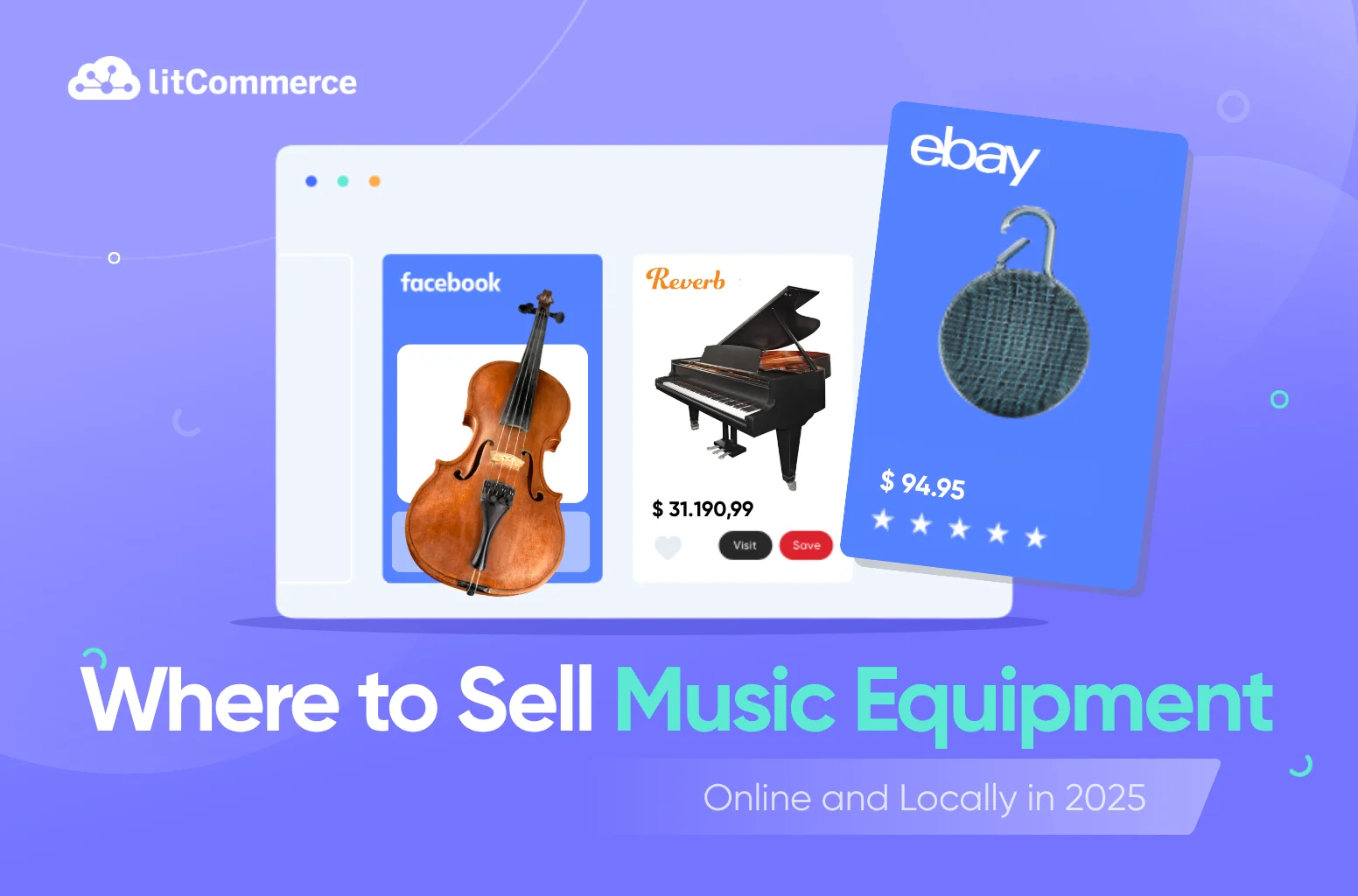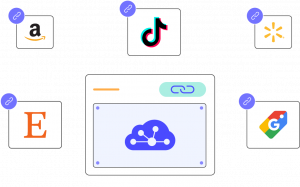For anyone looking to sell or upgrade their gear, one important question arises: where to sell music equipment? With so many options available both online and in stores, it’s not always clear what the best venues are.
I have researched and will walk you through the top marketplaces that you can use to sell their used instruments, pedals, amps, and more. I’ll compare top places to sell musical instruments like:
- Reverb – Best for all types of musical instruments
- eBay – Best for global reach & auctions
- Facebook Marketplace – Best for local, no-fee sales
- Craigslist – Best for quick local cash
- Sweetwater Gear Exchange – Best for trusted music resale
- Gearsupply – Best for pro audio gear
- Guitar Center Used – Best for quick cash/trade-in
- Music Go Round – Best for safe in-store selling
This article will help you understand where you can get the most exposure for your gear listings. So whether you have a guitar, drums, or studio equipment to offload, read on to find out where to sell musical instruments online.
Sell Music Gear Everywhere with LitCommerce
List once, sell your gear across top channels like Reverb, eBay, and Facebook, and manage all orders in one easy dashboard, saving you time while reaching more buyers.
Where to Sell Music Equipment – 8 Sites to Sell Online
Platform | Pros | Cons |
Reverb | - Large, music-focused audience - Good seller protection - Simple interface, strong support | - High fees (~8% total) - Shipping estimates often inaccurate - Issues with customer service in some cases |
eBay | - Vast global audience - Option for both auction and fixed price - No insertion fees | - Not music-focused, fierce competition - High overall fees (6–14%) - Needs paid ads for visibility in crowded categories |
Facebook Marketplace | - Huge local reach - No listing fee - Easy contact via Messenger - Transparent buyer/seller profiles | - No music specialization - Overwhelming messages, lowballers common - Must manage payment/shipping yourself |
Craigslist | - No fees, instant local cash - No shipping or taxes | - Higher risk of scams or unsafe meetups - Narrow local reach - You handle all logistics |
Sweetwater Gear Exchange | - Music specialist - No fees if paid in Sweetwater store credit - Slightly lower cash-out fee than Reverb | - Fewer buyers = slower sales outside big brands - No gift card use on Gear Exchange, only Sweetwater.com |
Gearsupply | - Industry/pro-audio focus, detailed listings with 360° imagery - Flexible: sell direct or marketplace | - Can be pricey for bundles - Limited in-person evaluation - Some negative reviews about order fulfillment |
Guitar Center Used | - Instant cash/trade-in, generous return policy - Physical locations - Good for quick sale | - Lower payouts than peer sale - Online listings may lack details/photos - Quality can vary—inspect if local |
Music Go Round | - Both online/in-store options - Instant cash/trade value - Safer than person-to-person | - Lower payouts than selling yourself - Franchise quality varies, some complaints on policies - Shipping sometimes costly |
There are several popular online marketplaces for selling used music equipment. Each platform has its own approach:
1. Reverb – Best for all types of musical instruments
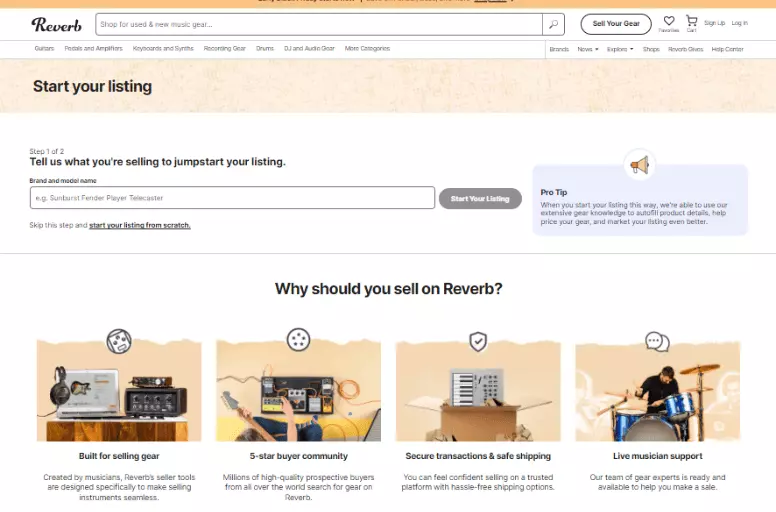
Reverb is a must-mention when discussing musical instruments. It is still the most popular choice for selling musical equipment online.
In fact, according to the SimilarWeb report in July 2024, the marketplace receives approximately 14.8 million visits per month. Unlike physical music stores that need to resell at a markup, Reverb allows sellers to price their items directly, often resulting in higher profits.
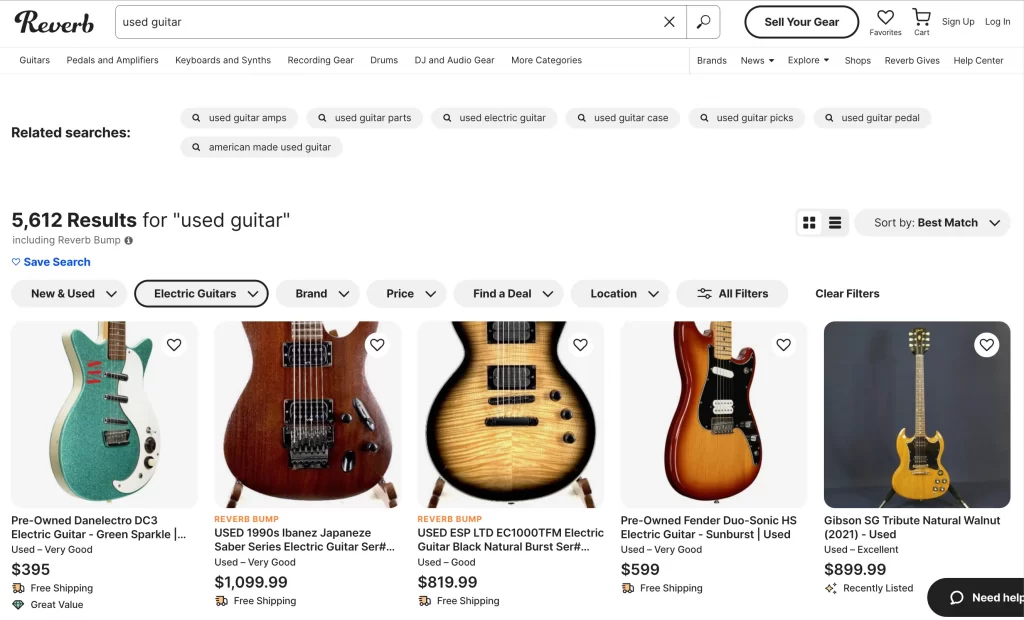
Is Reverb worth using in 2026?
Yes. If you’re selling guitars, pedals, synths, or pro audio gear, Reverb is still one of the best platforms available. It combines a loyal buyer base, music-specific search tools, and seller protection features that give you more control over your listings and profits.
Selling to a physical store, on the other hand, is different. These stores buy used gear from you and resell it for a profit. To do so, they can’t offer you the full potential value of your gear, as they need to factor in their own profit margin.
Reverb’s audience is deeply music-centric. The marketplace is home to:
- Musicians and audio professionals
- Studio owners and engineers
- Collectors and vintage gear enthusiasts
- Buyers from North America, Europe, and other active regions
This focused audience makes it easier for sellers to reach the right buyers without getting lost among unrelated product categories.
With no listing fees and a clear reputation among musicians, Reverb stands out as one of the most effective options for selling music equipment online.
Fees & payments
Selling on Reverb is straightforward, with no upfront cost to list.
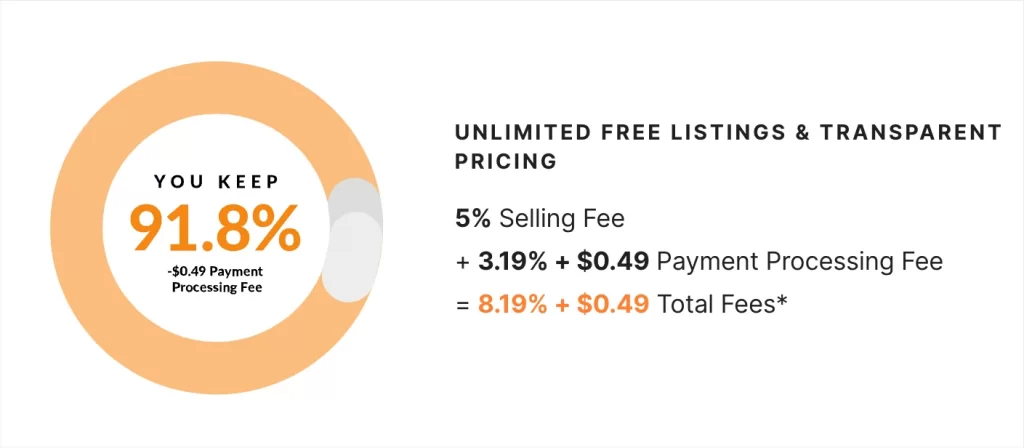
*The fee is 2.99% + $0.49 for Reverb Preferred Sellers.
For example, if you sell a guitar for $2,000, the cost for Reverb will be around 8,19% x 2,000$ = $163,8 + $0.49 = $164.29. After considering taxes and other fees, you will receive approximately $1,800.
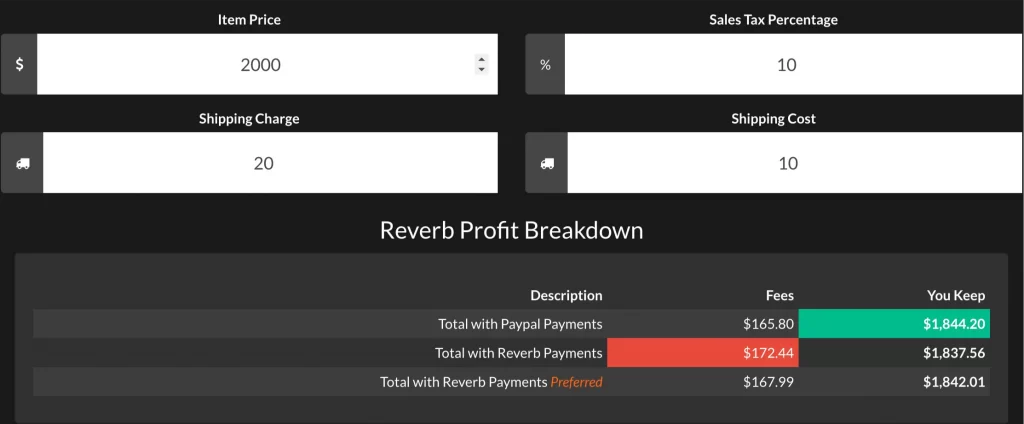
Ok, so is the 8,19% commission fee high? Let’s see how other platforms are charging.
- eBay charges 0% listing fee with a commission rate of 6.35% if sales are $7,500 or under. If sales are above $7,500, the fee drops to 2.35%.
- Facebook Marketplace has a 0% listing fee, 5% per shipment, or a flat fee of $0.40 for products costing $8.00 or below.
- Craigslist: no fee at all.
Compared to other platforms to sell your musical instruments, Reverb is slightly expensive.
Pro tip: Reverb also offers optional paid promotions like “Bump” to boost listing visibility.
What can you sell on Reverb?
Reverb supports a wide range of musical equipment. Both new and used gear are accepted, and listings for rare or boutique items often attract buyers quickly.
Here’s what sells best:
- Guitars and basses (electric, acoustic, vintage, boutique)
- Effects pedals (overdrive, delay, fuzz, modulation, custom builds)
- Audio gear (microphones, studio monitors, interfaces, rack gear)
- Keyboards and synthesizers (analog, digital, workstations)
- Drums and percussion (kits, snares, cymbals, e-drums)
- DJ gear (turntables, mixers, controllers)
- Orchestral instruments (brass, woodwinds, strings)
- Amps, cables, cases, and other accessories
Whether you’re a hobbyist cleaning out a home studio or a store reselling high-end gear, there’s likely a buyer for it on Reverb.
Overall, here are the pros and cons of selling your equipment on Reverb:
Pros of selling on Reverb
✅ Large, music-specific buyer base
✅ No listing fees, you only pay when you sell
✅ Secure payment processing and shipping protection
✅ Intuitive interface for managing inventory and sales
✅ Trusted name in the music equipment space
Cons of selling on Reverb
❌ Combined fees (~8%–8.2% + $0.49) can be higher than local options
❌ Shipping cost estimates may be inaccurate if not carefully calculated
❌ Customer support responsiveness can vary depending on the issue
❌ High competition, especially for common gear types
❌ Sellers earning over $2,500 per year in the U.S. will receive a 1099-K and need to file accordingly
If you are interested in this platform, read our detailed Reverb marketplace review for more information.
2. eBay – Best for global reach & auctions
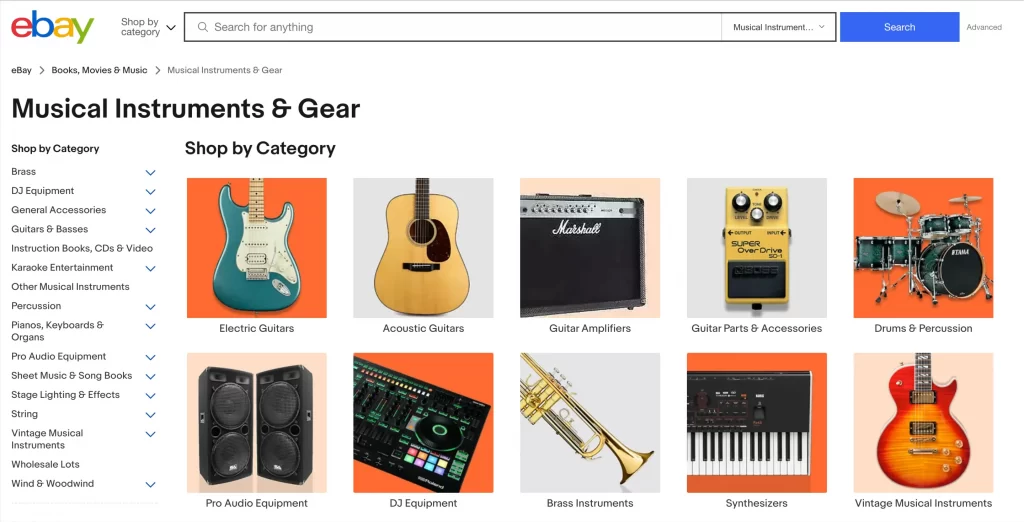
eBay is well known for being one of the best places to sell musical instruments and a hub of second-hand e-shopping. While it’s not a music-specific marketplace like Reverb, its sheer reach and flexibility make it a powerful option for sellers who want to connect with buyers across the globe.
According to SimilarWeb, eBay received 648.1 million total visits in July 2025, making it one of the highest-traffic online marketplaces in the world.
Who’s buying music gear on eBay?
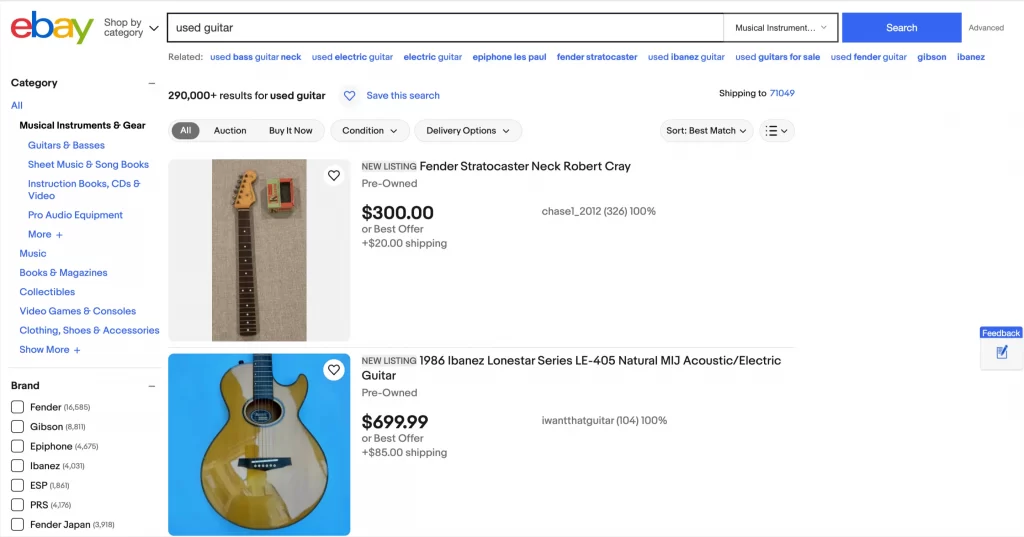
eBay’s audience is massive and diverse, spanning multiple buyer types and regions.
Mobile buyers between 18–34 years old drive the majority of instrument sales through the app, while buyers aged 35–64 dominate the high-end and pro audio categories. Many are musicians, collectors, or enthusiasts who know exactly what they want, and are willing to pay for it.
What to sell on eBay in 2026?
Some categories remain safe bets year after year, while others are gaining traction among both casual and pro musicians. Here’s what’s performing well:
- Guitars and basses – Electric, acoustic, vintage, and boutique models
- Pro audio gear – Interfaces, microphones, studio monitors, amps, outboard gear
- Drums and percussion – Full kits, e-drums, cymbals, accessories
- Keyboards and synths – Digital pianos, MIDI controllers, analog classics
- Band instruments – Brass and woodwind (trumpets, clarinets, flutes)
- DJ gear and lighting – Turntables, mixers, DJ controllers, stage lighting
- Accessories – Pedals, pickups, cables, strings, hard cases
- Beginner instruments – Affordable second-hand gear is in steady demand
- Rare and vintage gear – Collectible instruments attract global attention
Get to know eBay selling fees
eBay’s fees are slightly higher than niche platforms, but they’re streamlined, and predictable.
- Final value fee: Roughly 12%–13.6% of the total sale (including shipping and tax)
- Flat transaction fee: $0.30 per order
- Top-rated seller discount: 10% off the final value fee in most categories
- No separate payment processing fee: It’s already baked into the final value fee
For example, selling a $500 guitar with $50 shipping at a 12% rate would cost you around $66.30 in fees.
About eBay shipping and fulfillment
Shipping can be a dealbreaker for music gear sellers, but eBay has made the process easier with built-in tools and programs.
- Simple Delivery: Most private sellers use eBay’s automated label system with standard pricing and tracking. It’s ideal for packages within normal weight and size limits.
- Large instruments: Drum kits, amps, and oversized items may require freight shipping or courier coordination.
- Global Shipping Programme (GSP): You ship domestically; eBay handles customs and the international leg.
- Handling time: Sellers choose their own, though 1–2 business days is most common.
- Shipping fees: Usually paid by the buyer, though offering free shipping can help boost search visibility.
Also, with the refund policy, here’s something you should keep in mind. eBay offers buyer protection through its Money Back Guarantee, but sellers still have control over return terms.
If you allow returns, you can specify whether the buyer or seller pays return shipping. Most sellers offer a 14–30 day return window, which builds trust and improves visibility in search results.
Overall, here are the pros and cons of selling your equipment on eBay:
Pros
✅ Enormous buyer pool: reach buyers across North America, Europe, Asia, and beyond
✅ Flexible sale formats: fixed-price or auction listings can match your sales strategy
✅ Strong promotional tools: Promote listings, send offers, or run discounts
✅ Decent seller protections: dispute mediation and performance metrics
✅ Detailed analytics: price tracking, listing stats, and competitor insights
✅ Diverse product categories: sell new, used, rare, or custom gear
✅ Cross-border sales support: Global Shipping Programme simplifies international fulfillment
Cons
❌ Higher fees: Total selling costs often land between 12%–15%
❌ Tough competition: Many similar listings may require discounting or ads to stand out
❌ Shipping responsibilities: You’re in charge of accurate rates and safe packaging
❌ Return management: eBay may enforce returns if buyers report issues
❌ Scam potential: Some sellers report refund system abuse; documentation is key
❌ Delayed payouts: Funds may be held until delivery is confirmed, especially for new sellers
You can read our thorough guide on how to sell on eBay to start selling your musical instruments.
3. Facebook Marketplace – Best for local, no-fee sales
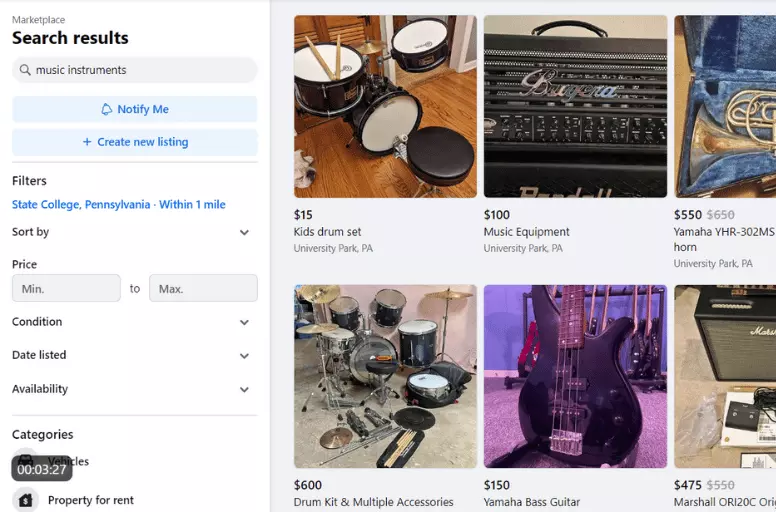
Facebook Marketplace continues to be one of the largest and most accessible platforms for selling music equipment. While it’s not niche like Reverb, Facebook Marketplace has maintained its strong position as a go-to for local and casual sales in 2026.
As a free service, Facebook Marketplace does not charge any listing fees. The fees are only applicable when an item is sold. For items above $8, Facebook charges a 5% transaction fee. If the price is below $8, a flat fee of $0.40 applies.
The best sellers on Facebook Marketplace can quickly sell their used instruments or upgrade their gear by taking advantage of the platform’s massive reach. Music gear sellers who connect directly with local communities or musicians’ groups have the highest potential for success.
The Facebook Marketplace audience
Facebook Marketplace may not be music-specific, but its vast and diverse user base is a huge draw. Young professionals, hobbyists, semi-professional musicians, and students are actively looking for instruments and gear at affordable prices. These buyers typically prefer local pickups to avoid high shipping fees.
The largest demographic on Facebook Marketplace is 25–34 years old, a group that is particularly mobile-savvy and active in buying and selling instruments for both personal and professional use. If you’re selling entry-level gear or used instruments, this is the crowd you’ll likely attract.
What sells best on Facebook Marketplace
Facebook Marketplace excels at facilitating local transactions. It’s ideal for selling:
- Used guitars and basses – from beginners’ models to intermediate-level instruments
- Keyboards and synthesizers – digital pianos, MIDI controllers, and affordable synths
- Amplifiers and pedals – guitar and bass amps, stompboxes
- Microphones and accessories – studio mics, cables, and cases
- Drums and percussion – drum kits, cymbals, drumsticks
- DJ equipment – controllers, turntables, mixers
- Entry-level instruments – affordable gear for beginners
However, it’s less ideal for selling high-end, rare, or boutique items since the platform lacks the buyer protections and specialized audience found on platforms like Reverb or eBay.
Pros
✅ No listing fees for local sales: Keep 100% of your sale price when selling locally.
✅ Large audience: Instantly tap into your local community or a broader national audience for shipped items.
✅ Direct communication: Messaging via Facebook Messenger makes it easy to negotiate, arrange meetups, and communicate clearly.
✅ Buyer/seller profiles: Unlike Craigslist, you can check profiles for legitimacy, which helps minimize scams.
✅ Flexible delivery: Offer both local pickups and nationwide shipping to cater to different buyer preferences.
✅ Simple listing process: No need for advanced tech skills—just take pictures and write a description.
✅ Community connections: Take advantage of local groups and niche pages, plus word-of-mouth within musician communities.
Cons
❌ Not music-specific: Your listing might get lost among unrelated items, making it harder to find serious buyers compared to specialized platforms.
❌ Potential scams and lowball offers: Expect to deal with non-serious buyers, aggressive negotiators, or potential scams.
❌ Manual shipping: Starting in February 2025, sellers are responsible for purchasing their own shipping labels. Miscalculating shipping costs can eat into your profits.
❌ Refunds and returns: Facebook favors the buyer when disputes arise, which can lead to chargebacks and lost payouts. Sellers may also need to handle return shipping.
❌ Less buyer protection for local sales: For cash transactions, Facebook offers no mediation. Meeting in public, safe locations is crucial to avoid issues.
Learn how to start an online boutique on Facebook to open your new music gear store.
4. Craigslist – Best for quick local cash
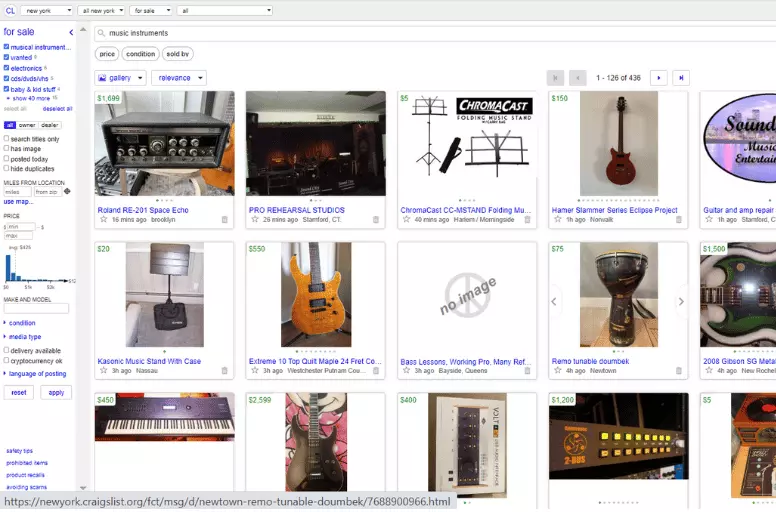
Craigslist remains one of the simplest and most cost-effective ways to sell music equipment locally. While it doesn’t have the built-in buyer protections or massive global audience of platforms like eBay or Reverb, it excels in local, fast, and fee-free transactions.
Since its launch in the mid-90s, Craigslist has built a reputation for connecting sellers with nearby buyers, making it a go-to option for musicians who want to avoid shipping large or fragile items. In 2026, it still works best for straightforward deals: you post an ad, meet in person, and walk away with cash in hand.
So, who shops on Craigslist?
Craigslist’s audience skews slightly older than many other selling platforms. The largest age group is 45–54, but its reach spans from students buying their first guitar to seasoned players hunting for affordable upgrades.
Its local focus attracts parents shopping for school instruments, hobbyists looking for bargains, and semi-pro musicians seeking gear they can test before buying. You’ll also find repair techs and gear flippers scanning the listings daily for underpriced equipment they can refurbish and resell.
What sells best on Craigslist?
Craigslist is ideal for gear that’s easy to evaluate in person and too cumbersome or risky to ship. Commonly sold items include:
- Used and entry-level instruments: electric and acoustic guitars, basses, keyboards, drums
- Amps and effects pedals: guitar and bass amps, stompboxes, multi-effects units
- Pro audio gear: microphones, mixers, monitors, PA systems
- DJ equipment: turntables, controllers, mixers
- Band and orchestra instruments: brass, woodwinds, and strings
- Bulky studio gear: stands, racks, cases, large synths
It’s less ideal for high-value or rare gear, where you’d want a larger, more specialized audience and stronger transaction protection.
Overall, here are the pros and cons of selling your equipment on Craigslist
Pros of selling on Craigslist:
✅ No fees: You keep 100% of the sale price for most personal music gear listings.
✅ Local, cash sales: Skip shipping costs and receive payment immediately.
✅ Fast turnaround: Popular items can sell the same day they’re posted.
✅ Simple process: No account needed; just create a listing, negotiate, and meet.
✅ Great for bulky gear: Avoid shipping challenges and costs for large or fragile items.
✅ Negotiation-friendly: Buyers expect some back-and-forth, giving you room to adjust prices.
✅ No platform rules or taxes: Transactions are between you and the buyer only.
Cons of selling on Craigslist:
❌ Safety risks: You’re meeting strangers, so public meetups are a must.
❌ Scam potential: Overpayment schemes, fake buyers, and phishing attempts are more common here.
❌ No buyer or seller protection: If something goes wrong, you have no recourse.
❌ Limited reach for rare gear: Specialty items won’t get the same exposure they would on Reverb or eBay.
❌ Time-wasters: Expect “Is this still available?” messages and aggressive low offers.
❌ DIY logistics: You manage all communication, scheduling, and delivery arrangements.
5. Sweetwater Gear Exchange – Best for trusted music resale
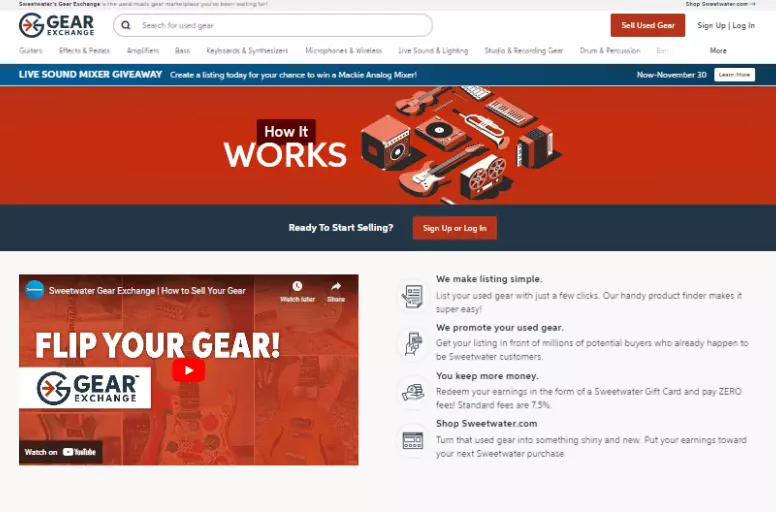
If you’re looking for where to sell musical instruments, then Sweetwater Gear Exchange is also one of the great options. It is still the new kid on the block compared to Reverb or eBay, but it’s quickly earning a solid reputation among U.S. musicians.
Backed by the trusted Sweetwater brand, this platform offers a music-only marketplace that feels more personal than the larger, crowded online giants.
One of its biggest draws is its zero-fee option; if you take your payout as a Sweetwater gift card, you keep 100% of the sale price. For sellers who plan to reinvest in gear, that’s about as good as it gets.
If you prefer cash, the flat 7.5% total fee (5% seller’s fee + 2.5% transaction fee) is still lower than most competitors, making it attractive for regular gear flippers and hobbyists alike.
Who shops the most on Sweetwater Gear Exchange?
This is a platform built by musicians, for musicians. Most buyers are already Sweetwater customers, people who trust the brand and know their way around a guitar pedal or studio interface.
While it doesn’t yet match the massive reach of Reverb or eBay, the audience is highly targeted and motivated. You’re not competing with kitchen appliance sellers or sneaker resellers, everyone is here for music gear. That means your Fender Strat, Roland synth, or Shure mic is in front of people who actually know what they’re looking at.
The majority of sales feature mainstream brands such as Fender, Gibson, Roland, and Yamaha, but boutique and vintage items are also welcome. Just keep in mind that rare or off-brand gear might take a little longer to move simply because the buyer pool is smaller.
What sells best on Sweetwater Gear Exchange?
- Guitars & Basses: electric, acoustic, and bass models
- Amps & Pedals: combo amps, heads, cabinets, and effects
- Keyboards & Synths: workstations, digital pianos, analog synths
- Pro Audio: microphones, studio monitors, audio interfaces
- Live Sound & DJ Gear: PA systems, controllers, mixers
- Drums & Percussion: acoustic kits, electronic drums, cymbals
- Brass, Woodwinds & Orchestra Instruments: trumpets, flutes, violins
Only used gear from individuals is allowed—no new stock and no business seller listings.
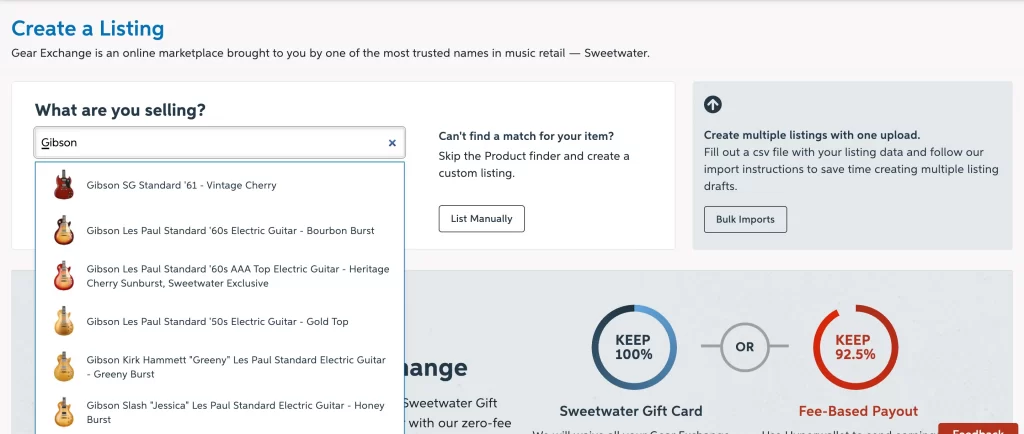
Pros of selling music equipment on Sweetwater:
✅ Zero fees with gift card payout: Keep the full sale amount if you spend it on Sweetwater.com.
✅ Low cash fees: Just 7.5% total, undercutting most major competitors.
✅ Music-focused marketplace: No unrelated clutter; buyers are serious musicians.
✅ Trust factor: Backed by Sweetwater’s strong customer service reputation.
✅ Fair playing field: No paid promotions or “boosts” for visibility.
✅ Local pickup option: Save on shipping for heavy or fragile items.
✅ Easy setup: Especially seamless if you already have a Sweetwater account.
Cons of selling music equipment on Sweetwater:
❌ Smaller buyer base: Fewer eyes on your listings, especially for niche gear.
❌ Best for mainstream gear: Lesser-known brands may get less traction.
❌ Gift card restriction for no fee: 100% payout only applies if you want store credit.
❌ No business sellers: Individuals only, which limits bulk resale.
❌ Relatively new platform: Still growing and refining payment/shipping systems.
❌ Protection still evolving: Seller and buyer safeguards aren’t as developed as eBay’s or Reverb’s.
If you’re a U.S.-based musician who often shops at Sweetwater, Gear Exchange is a no-brainer, especially if you’re happy to take payment in store credit. Even if you want cash, the low fees and music-only focus make it a worthy alternative to bigger, noisier marketplaces.
6. Gearsupply – Best for pro audio gear

Gearsupply isn’t trying to be the next Reverb or eBay, and that’s a good thing.
Instead, it’s carved out a specialist niche in the professional audio, lighting, and live event equipment market. If you’re sitting on a used line array, a lighting rig, or a festival-ready sound system, this is where your listing is going to feel right at home.
The platform offers two main selling routes: list it in the community marketplace or sell directly to Gearsupply for a quick buyout. With commissions at 6.5% (plus payment processing fees) and no listing fees, it’s more affordable than traditional AV brokers, who often charge 10–15%.
For sellers who need speed, Gearsupply’s buyout option typically pays 70–80% of fair market value, less than you might get selling yourself, but much faster.
What’s the Gearsupply buyer base?
This isn’t a casual, browse-and-buy kind of audience. Buyers here are industry professionals, think AV rental companies, live sound engineers, churches, theaters, event venues, and production crews.
The most active market is in North America, but international buyers also shop for the right deal, especially on top-tier brands like Meyer Sound, JBL, L-Acoustics, and d&b audiotechnik.
What really stands out is the bulk-buy potential; you’re not just selling one amp to a hobbyist, you could be offloading an entire rig to a venue or festival organizer. That kind of transaction is hard to pull off on general marketplaces.
Best gear to sell on Gearsupply
- Pro Audio: mixing consoles, amplifiers, speakers, subwoofers, monitors
- Lighting Systems: moving heads, LED panels, rigs
- Video & Staging: projectors, LED walls, truss systems, rigging hardware
- DJ & Event Gear: controllers, mixers, playback systems
- Venue & Festival Bundles: full systems for installations or touring setups
- Outboard & Accessories: racks, processors, cabling, power distribution
Entry-level gear like beginner guitars or consumer-grade keyboards? Not the right audience here. This is strictly a pro and semi-pro gear market.
Pros of selling on Gearsupply
✅ Industry-specific audience: Every visitor is in the live events or pro AV space.
✅ High trust: Detailed 360° product photos and inspection reports help sell faster.
✅ Flexible sales options: Choose between marketplace listings or quick direct buyouts.
✅ Bulk sales ready: Perfect for offloading large venue or festival packages.
✅ Lower commission than brokers: 6.5% beats the 10–15% common in AV brokerage.
✅ Sustainability focus: The #WeHateWaste initiative promotes responsible gear reuse.
✅ Seller support: Assistance with listings, freight logistics, and negotiations.
Cons of selling on Gearsupply
❌ Smaller buyer pool: Niche market means slower sales for off-brand or unusual gear.
❌ Fees still add up: 6.5% commission + payment processing can pinch margins.
❌ Not for consumer gear: Entry-level instruments won’t move well here.
❌ Remote-only sales: No retail storefront; buyers can’t test in person.
❌ Big-ticket limitations: Some premium gear may be out of reach for smaller buyers.
7. Guitar Center Used – Best for quick cash/trade-in
If you want to turn your music gear into cash today, Guitar Center Used is one of the fastest options around. Unlike Reverb or eBay, you won’t be listing your item online or waiting for a buyer to make an offer; instead, Guitar Center buys your gear directly. You walk in with your instrument, and walk out with cash or a check.
The trade-off for speed and convenience is payout size. Most sellers report getting 30–60% of the store’s resale price, with the average hovering closer to 30–40% for common gear. That means a guitar they’ll list for $500 might earn you $150–$200 on the spot.
For many musicians, the appeal lies in no shipping hassles, no scams, and no waiting weeks for payment. If you’ve got a popular brand in good condition, you can sell it in a single afternoon.
What’s the Guitar Center buyer base?
The used section at Guitar Center draws a wide demographic, from teenage beginners shopping for their first guitar to gigging professionals hunting for backup gear.
You’ll also find collectors, budget-conscious parents buying student instruments, and gear flippers scouting for underpriced gems. The biggest advantage for buyers is being able to try before buying, making the store a steady source of same-day deals.
Best gear to sell at Guitar Center
- Guitars & Basses: acoustic, electric, and bass models from brands like Fender, Gibson, Epiphone, and Squier
- Amps & Pedals: popular effect pedals, combos, and stacks
- Drums & Percussion: full kits, snares, cymbals, and electronic kits
- Keyboards & Synths: Yamaha, Roland, Casio, and similar mainstream brands
- Pro Audio & Recording Gear: mixers, monitors, interfaces, microphones
They will also consider vintage or boutique gear, but don’t expect the same value you’d get from peer-to-peer marketplaces. Their buy-in price is based on quick resale potential, not rarity.
Pros of selling to Guitar Center
✅ Instant payout: Cash or check the same day you bring it in
✅ No shipping or online listing: Everything happens in-store
✅ Nationwide presence: Sell at hundreds of locations
✅ Safe transaction: No scams or fraudulent payments
✅ On-site appraisal: Gear tested and valued before you agree
✅ Trusted brand: Well-known in the music retail space
Cons of selling to Guitar Center
❌ Lower payout: Often 30–40% of resale value
❌ Selective purchasing: May reject items based on inventory or demand
❌ No negotiation: Offers are typically final
❌ Condition sensitivity: Cosmetic wear lowers offers significantly
❌ Limited to physical stores: You transport gear yourself
❌ Not ideal for rare gear: Boutique pieces may be undervalued
8. Music Go Round – Best for safe in-store selling
Music Go Round is a chain of used music gear stores that makes selling simple; you walk in with your instrument, and they appraise and buy it on the spot. No online listings, no waiting for a buyer, and no shipping hassles.
Most sellers get 40–60% of the resale price, with the average hovering around 50%. That means if they plan to sell your guitar for $400, you’ll likely get an offer between $160–$240. It’s less than you’d make on Reverb or eBay, but you’re trading profit for instant payment and zero hassle.
Payment is usually via check or store credit, though some locations offer cash for smaller amounts. And if you’re looking to upgrade, you can trade in gear for higher-value equipment right on the spot.
Who shops at Music Go Round?
The buyer base is local and community-driven, comprising students, parents, hobbyists, and semi-pro musicians all seeking affordable, high-quality gear.
It’s also a go-to spot for educators and school programs sourcing beginner band instruments, as well as bargain hunters browsing for secondhand finds. Many shoppers appreciate being able to test gear in person before buying, making in-store inventory move quickly.
Best gear to sell at Music Go Round
- Guitars & Basses: acoustic, electric, basses, pedals, and accessories
- Drums & Percussion: kits, snares, cymbals, hand percussion
- Keyboards & MIDI: synthesizers, digital pianos, controllers
- Brass & Woodwinds: trumpets, saxophones, clarinets, flutes
- Pro Audio: mixers, microphones, monitors, PA systems
- DJ Gear & Lighting: controllers, turntables, effects lighting
- Accessories: cases, stands, cables, and more
Mainstream brands like Fender, Gibson, Yamaha, Roland, and Boss move fastest, but boutique and vintage pieces are also welcome if they’re in working condition.
Pros of selling to Music Go Round
✅ Instant payment: Cash, check, or store credit on the spot
✅ No listing or shipping: Everything handled in person
✅ Consistent demand: They buy a wide variety of gear daily
✅ Community-oriented: Staff are musicians, stores support local music scenes
✅ Trade-in option: Upgrade to new gear immediately
✅ Buyer confidence: All gear is tested and inspected before resale
Cons of selling to Music Go Round
❌ Lower payout: 40–60% of resale value vs. higher margins online
❌ No negotiation: Offers are usually final
❌ Selective purchasing: Must be in working order and in-demand
❌ Local only: Must visit a store; no mail-in sales for most sellers
❌ Not ideal for rare gear: May undervalue boutique or collectible items
In conclusion, if your gear is mainstream and in good condition, local options offer quick, safe transactions. But if you have rare, vintage, or high-value items, online marketplaces with global reach will help you get top dollar.
How to Sell Second-Hand Music Equipment
If you have used musical instruments and want to sell them quickly, here is the guide:
1. Clean and prepare the equipment
You should thoroughly clean the equipment inside and out, removing dust, fingerprints, or grime. If necessary, replace batteries or strings to ensure everything is in working order.
2. Assess your equipment
You should make a detailed list of the equipment you want to sell, including the brand, model, age, condition, and any accessories. Next, check online marketplaces (Reverb, eBay) and local music stores to gauge the current market value of similar items. Or you can use the Reverb Price Guide to get an estimated price based on your instrument’s model and condition.
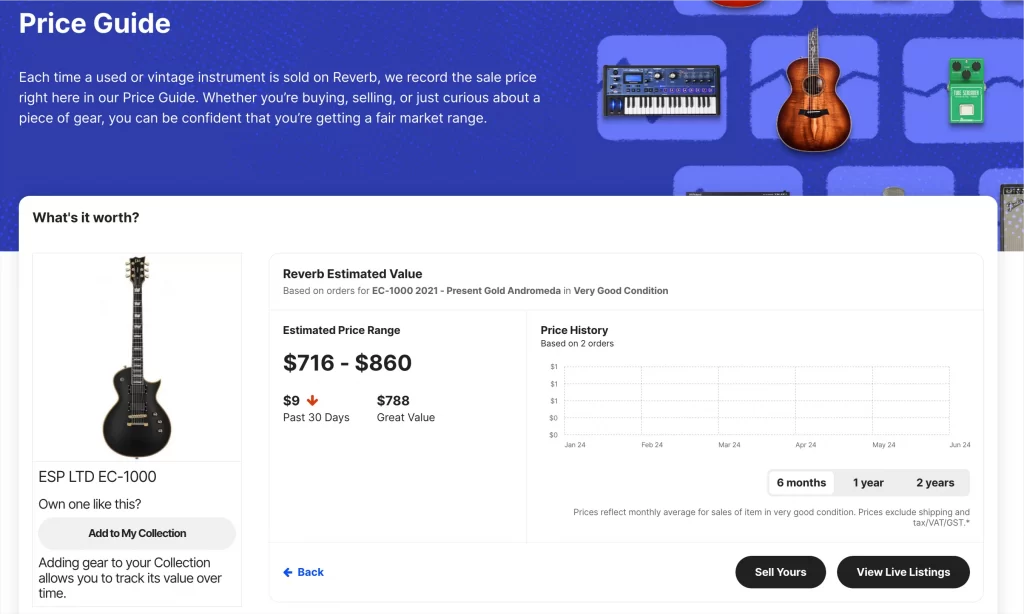
3. Optimize your music gear listing
First, write down the specific details of your equipment, including brand, model, year of manufacture, features, and any modifications.
Next, it’s time to craft a compelling listing. You should use clear and concise titles that accurately reflect the equipment. Also, include relevant keywords that potential buyers might search for (e.g., “Fender Stratocaster Electric Guitar,” “Shure SM58 Microphone”).
High-quality images are also important. Take clear, well-lit photos from multiple angles. Besides, you should show any cosmetic imperfections or damage honestly.
Now, price your items competitively based on your research. One important thing to remember: you’re selling used gear, so be realistic about pricing. Also, you should decide if you’re willing to negotiate on prices.
4. Choose a platform to sell on
The best places to sell used instruments include Reverb, eBay, Facebook Marketplace, or local options like Craigslist, pawn shops, or music stores in your area. High-value items may be better suited for Reverb or eBay, while less valuable items might do well on Facebook Marketplace or Craigslist.
List Music Gear on More Channels with LitCommerce!
Strum up more sales! Stop limiting your audience. List your instruments and equipment on all the top marketplaces with LitCommerce’s multichannel listing tool.
Tips to Maximize Your Musical Instrument Sales Potential
Now you know where to sell music equipment. Whether selling through online marketplaces or in your own store, there are strategies to boost your musical instrument sales. With the right approach, you can tap into the large market of musicians seeking new and used gear.
- Optimize listings for visibility: First, you should take clear, well-lit photos showcasing the instrument from multiple angles. Then, include comprehensive details on specs and conditions to help buyers find your listing. Also, remember to keep prices competitive to attract interest.
- Provide prompt responses: Timely communication builds trust with potential buyers. So, you should respond quickly to messages, whether it’s questions about the item or working out payment and shipping logistics. Make sure to leave buyers satisfied with their experience.
- Ensure transparency in transactions: You need to clearly describe the instrument’s features and any signs of wear. Besides, be upfront about shipping costs and policies. Process payments securely and get the item to buyers without delay. And remember that honesty will earn you positive reviews that bring more sales.
Listing your music equipment on multiple platforms like eBay or Reverb can maximize your chances of finding the right buyer. However, managing inventory and orders across different channels can be a hassle. LitCommerce simplifies this process by allowing you to easily list and manage your instruments on multiple marketplaces from one central dashboard.
Where to Sell a Guitar – FAQs
The best place to sell used music equipment depends on your specific needs and goals. National marketplaces like Reverb and eBay provide the largest potential audience but charge fees. For local sales with no fees, Craigslist and Facebook Marketplace are best. Yes, you can sell music equipment to Guitar Center. They buy a variety of used guitars, amps, drums, DJ equipment, and more, depending on brand, age, and condition. Get an offer online first before visiting your local Guitar Center store. Yes, Sweetwater buys certain used guitars that meet their criteria. They evaluate each guitar on a case-by-case basis to determine quality and value. Sweetwater then offers store credit for the appraised amount, which can be put towards new gear.
Turn Your Music Instruments Into Cash Now!
In conclusion, musicians have several good options for where to sell music equipment. You can find local buyers on Craigslist or Facebook and reach a bigger audience nationwide on Reverb or eBay. It’s also worth checking if stores like Sweetwater or Guitar Center will purchase individual instruments.
If you have any questions about where to sell musical instruments, feel free to contact us. You can also visit our Blog and Facebook Community to learn more tips to succeed in selling music instruments and other gear.

